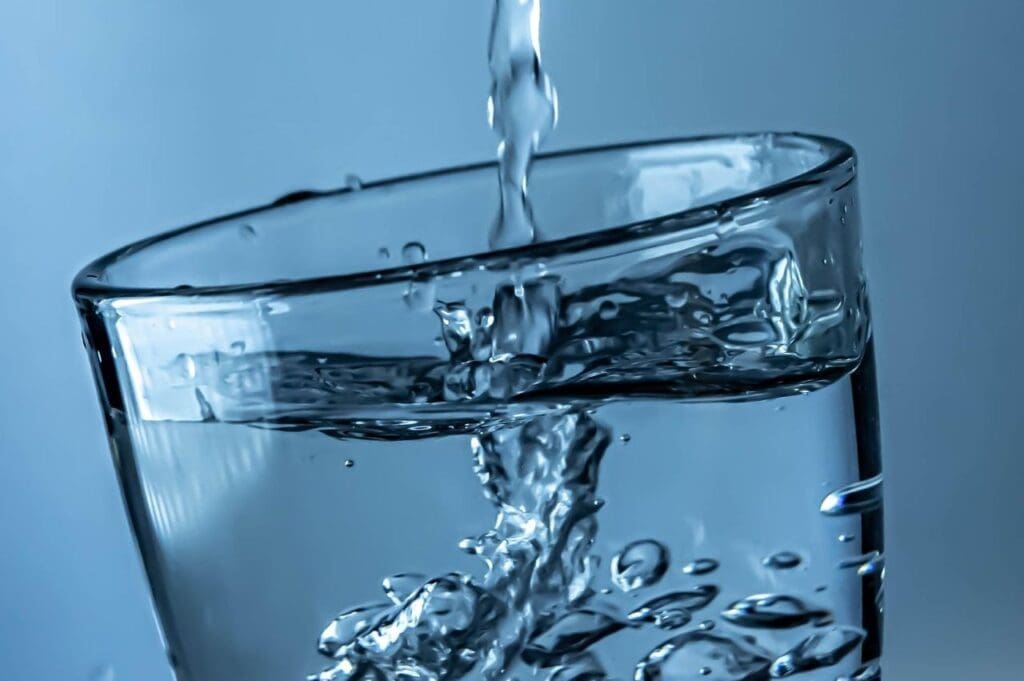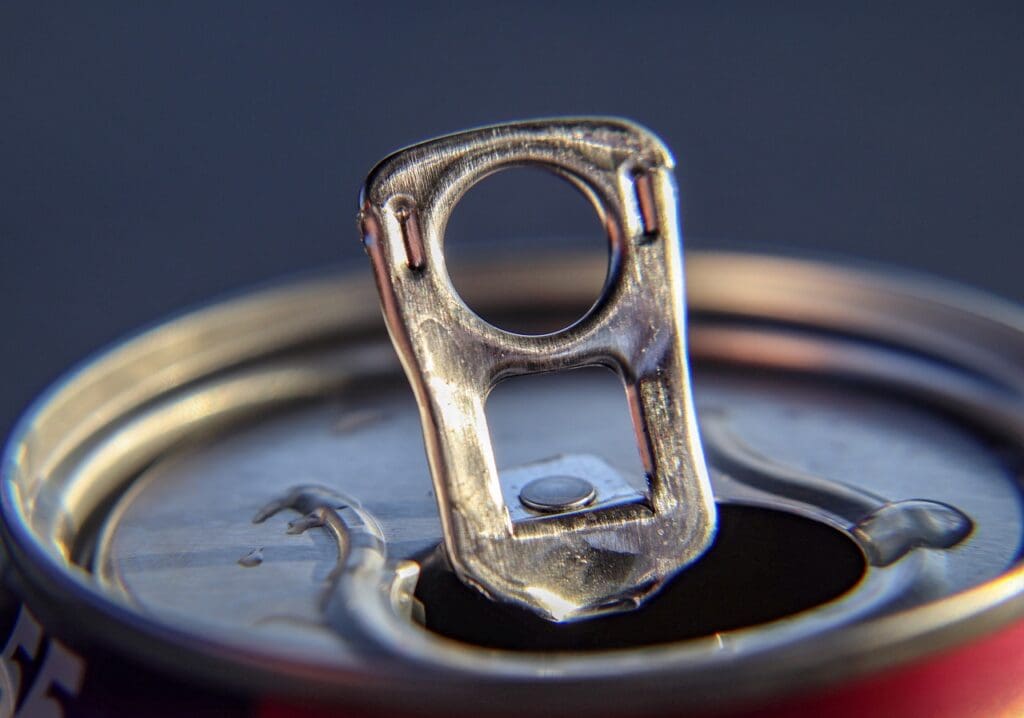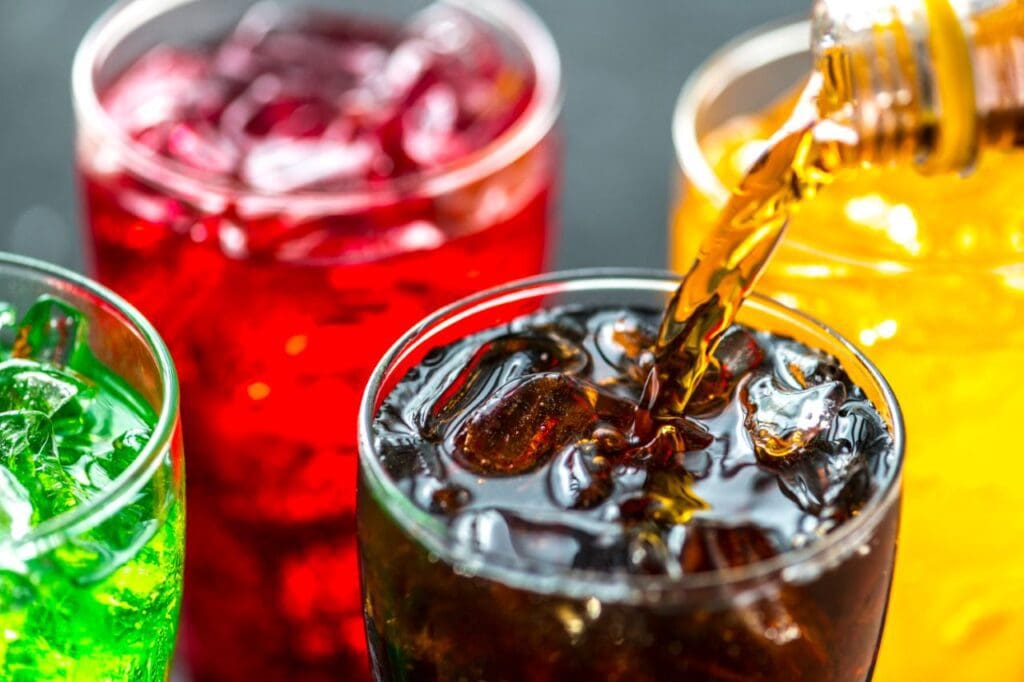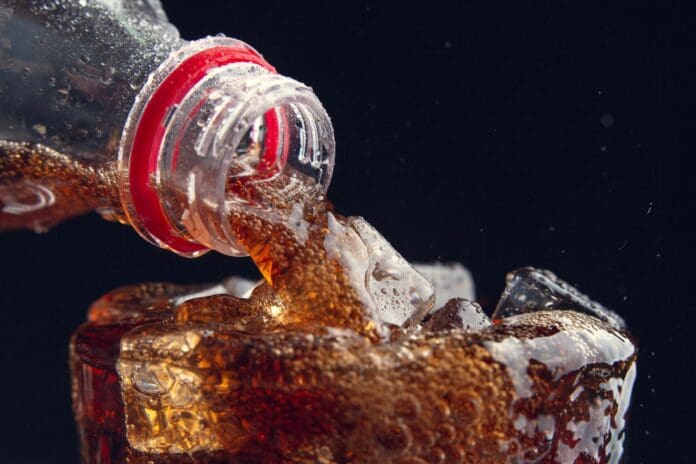The dangers of drinking to much soda, cola, or pop, particularly sugary sodas, can increase the risk of weight gain, obesity, type 2 diabetes, heart disease, and tooth decay, among other health problems. Despite having no calories, diet sodas have been connected to a number of health issues, such as an elevated risk of atrial fibrillation and metabolic syndrome.
Dangers of Sugar-Sweetened Soda:
Obesity and Weight Gain: The high sugar content of soda raises calorie intake, which raises the risk of obesity and causes weight gain.
Type 2 Diabetes: Research indicates a connection between a higher risk of type 2 diabetes and frequent soda consumption.
Heart Disease: Sugar-filled beverages are linked to increased blood pressure, elevated cholesterol, and additional heart disease risk factors according to WebMD.
Cavities and Tooth Decay: Soda’s acidity and sugar can erode tooth enamel, increasing its vulnerability to dental decay and cavities.
Other Health Issues: Frequent soda use has also been connected to gout, non-alcoholic fatty liver disease, and possibly a higher risk of developing some types of cancer.
Dangers of Drinking Diet Soda:
Increased Risk of Metabolic Syndrome: According to certain research, drinking diet soda may raise your risk of developing metabolic syndrome, a group of illnesses that raise your risk of diabetes, heart disease, and stroke.
Atrial Fibrillation: A form of irregular heart rhythm, atrial fibrillation has been associated with both sugary and diet sodas.
Potential for Dental Problems: Although diet sodas don’t contain calories, they do contain acids that can break down tooth enamel and cause cavities.
Substitutes for Soda:
To avoid the dangers of drinking sugary sodas the greatest and most advised substitute for hydration is water.
Unsweetened Drinks: Milk, coffee, and tea are all good options.
Fruit Juices in Moderation: Because fruit juices contain sugar, it’s crucial to consume them sparingly even though they can be a healthier option to soda.

Ingredients for Basic Cola:
Carbonated water, a sweetener (such as sugar or high fructose corn syrup), and a mixture of natural flavors—such as citrus oils, vanilla, cinnamon, and other spices—are the usual ingredients of cola drinks. A particular cola formula, such as that of Coca-Cola, additionally contains caffeine, phosphoric acid for a tangy flavor, and caramel color for its distinctive dark brown hue.
A more thorough explanation of the typical ingredients is provided below:
The carbonated water is what gives drinking sodas their fizz is its base.
Sweetener: This can be high-fructose corn syrup, sugar (sucrose), or, in diet versions, artificial sweeteners like aspartame or aspartame potassium.
Caramel Color: Adds to the flavor and gives cola its dark brown hue.
Phosphoric Acid: Aids in preservation and adds a tangy flavor.
Natural Flavors: a mixture of cinnamon, vanilla, citrus oils (from the peels of oranges, limes, and lemons), and possibly other unidentified ingredients.
Caffeine: A flavoring and stimulant.
The decocainized (i.e., cocaine-free) Coca Leaf Extract is used as a flavoring in Coca-Cola.
Components of Diet Soda:
Carbonated water, sweeteners, caramel color, acids, and preservatives are common ingredients in diet soda. Aspartame, aspartame potassium, and sucrase are examples of common sweeteners. Phosphoric acid, citric acid, potassium benzoate, natural flavors, and occasionally caffeine are examples of additional ingredients.
Here’s a more thorough explanation:
The base and fizz of drinking sodas are provided by carbonated water.
Sweeteners: These give food a sweet taste without adding calories by substituting sugar. Typical instances consist of:
One common artificial sweetener is aspartame.
Another artificial sweetener that is frequently combined with aspartame is Acesulfame Potassium, also known as Acesulfame K.
Sucralose is a sugar-based artificial sweetener that the body cannot absorb. The danger of drinking soda.
Stevia: An all-natural sweetener with no calories.
Caramel Color: Contributes the distinctive shade of brown.
Acids: Citric and phosphoric acids add flavor and tartness.
Preservatives: To help preserve freshness, potassium or sodium benzoate are used.
Natural Flavors: These improve the flavor in general.

Components of a Grape-Flavored Soda:
Carbonated water, sugar (either cane sugar or high fructose corn syrup), citric acid, natural or artificial flavors, and coloring agents like Red 40 and Blue 1 are the usual ingredients of grape-flavored drinking soda. Preservatives such as gum acacia, tartaric acid, and sodium benzoate are also used in some recipes.
Here’s a more thorough explanation:
The fizz comes from carbonated water.
Sugar: Provides sweetness. Although both are utilized, cane sugar is occasionally chosen over high fructose corn syrup.
Citric Acid: Serves as a preservative and adds to the tartness.
The grape flavor of the soda comes from natural and/or artificial flavors. Also petroleum-based sources are frequently used to create artificial flavors.
Coloring Agents: To give grape soda its distinctive purple hue, two popular artificial food colorings are Red 40 and Blue 1.
Preservatives: One common preservative that aids in preventing spoiling is sodium benzoate.
Additional Ingredients: For flavor or texture, some sodas may contain gum acacia, tartaric acid, or other ingredients.
It’s important to keep in mind that different grape soda brands may have slightly different ingredients. For instance, some people might substitute or add grape juice concentrate to artificial flavors.
Components of a Soda With a Lemon-Lime Flavor:
Carbonated water, citric acid, a sweetener (such as high fructose corn syrup), natural flavors, and occasionally preservatives like potassium or sodium benzoate are the main ingredients of lemon-lime flavored sugary sodas. To improve or preserve the flavor, some brands may also add extra ingredients like calcium disodium EDTA, potassium citrate, or sodium citrate.
Here’s a more thorough explanation:
The effervescence that gives drinking soda its distinctive fizz is provided by carbonated water.
Sweetener: Usually high fructose corn syrup, but some brands might also use sugar or stevia.
Citric Acid: Serves as a preservative and imparts a sour, tart taste.
Natural Flavors: Usually obtained from lemon and lime oils or extracts, these give food a taste of lemon and lime.
Preservatives: Chemicals such as sodium benzoate or potassium benzoate prolongs shelf life and keeps food from spoiling.
Potassium and sodium citrate are substances that have the ability to control acidity and enhance flavor.
By binding with metal ions that can produce off flavors, calcium disodium EDTA helps to preserve the soda’s flavor.
Additional possible ingredients: Glycerol ester of rosin, modified food starch, or artificial coloring like yellow 5 may be present in some lemon-lime sodas.

Components of a Soda With a Root Beer Flavor:
The distinctive, sweet flavor of root beer, a carbonated beverage, is frequently characterized as a combination of licorice, wintergreen, vanilla, and other herbs and spices. Carbonated water, sugar or high fructose corn syrup, and a mixture of artificial and natural flavorings—occasionally sassafras extract—are the main components. The distinctive brown hue of root beer is also derived from caramel coloring.
Here’s a more thorough explanation:
The foundation of the beverage that gives it its fizz is carbonated water.
Sweetener: In the past, different sweeteners, such as sugar or molasses, were employed. High fructose corn syrup is frequently used in modern root beers, though some brands also use cane sugar or other sweeteners.
Flavors: This is what gives root beer its unique flavor. Important taste elements frequently consist of:
Sassafras: Traditionally used as the main flavoring. Therefore, artificial sassafras flavoring is frequently substituted because of safety concerns.
Another popular root used for flavor is sarsaparilla.
Wintergreen: Adds a hint of mint.
Licorice: Contributes a mildly bittersweet taste.
Vanilla: Offers a sweet, creamy foundation.
Additional herbs and spices: Anise, cinnamon, molasses, and other roots and barks may be added, depending on the recipe.
Caramel coloring is used to give root beer its distinctive brown hue.
Sodium benzoate is a common preservative used to increase shelf life.
Acidity Regulators: To balance the sweetness and flavor, phosphoric or citric acid may be added.
Foam Enhancers: To produce a foamy head, some recipes call for ingredients like soybean protein or yucca.
Dangers of Drinking Soda: Which soda is the worst for your health?
Generally speaking, sugary sodas with a lot of artificial ingredients and added sugars are the worst for your health. Because of their high sugar content, sodas like Mountain Dew, Welch’s Grape Soda, and Nitro Pepsi Draft Cola are frequently ranked among the least healthful. Even though diet sodas might seem like a better option, there are some possible health risks associated with them, such as the possibility of weight gain and connections to type 2 diabetes.
Here’s a closer look:
Elevated Sugar Content:
A lot of sodas contain added sugars, which can lead to heart disease, type 2 diabetes, and weight gain.
Welch’s Grape Soda, Nitro Pepsi Draft Cola, and Mountain Dew varieties like Code Red and Live Wire are a few examples of sodas that are high in sugar.
A single can of some sodas can contain more added sugar than the 50 mg recommended daily by health authorities.
Other Additives and Artificial Sweeteners:
Despite having fewer calories, diet sodas frequently contain artificial sweeteners that may be harmful to your health.
According to some research, artificial sweeteners, in diet soda, may cause weight gain by deceiving the body into craving more calories per Johns Hopkins.
Artificial dyes and other undesirable substances that may be harmful to one’s health may be present in other sodas.
Overall Effect:
Sugary sodas only contain calories and sugar, with little to no nutritional value.
A number of health problems, such as obesity, type 2 diabetes, and heart disease, are associated with excessive consumption of sugary drinks.
Because of their acidity, sodas can also have a detrimental effect on oral health by causing tooth decay and enamel damage.

